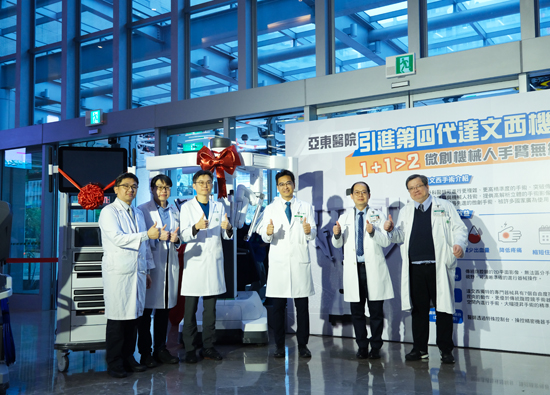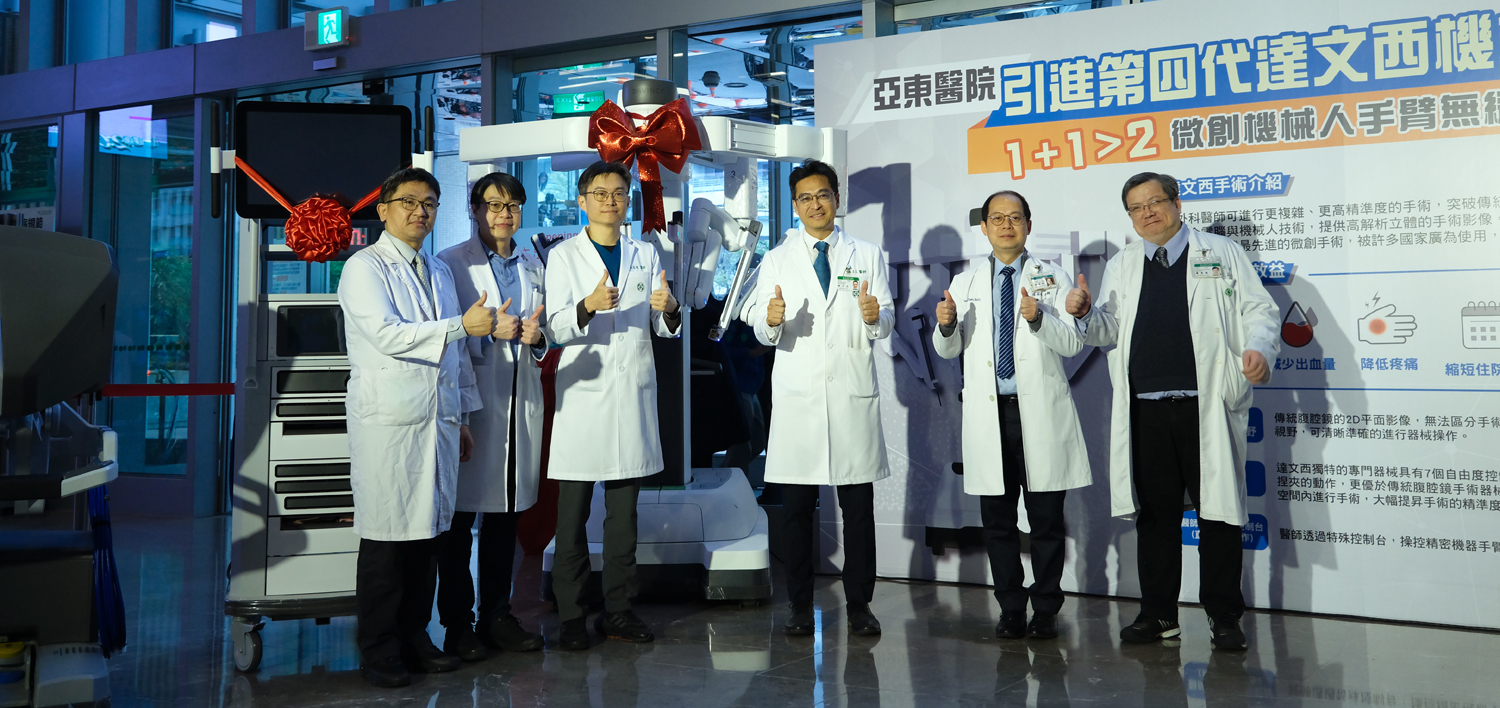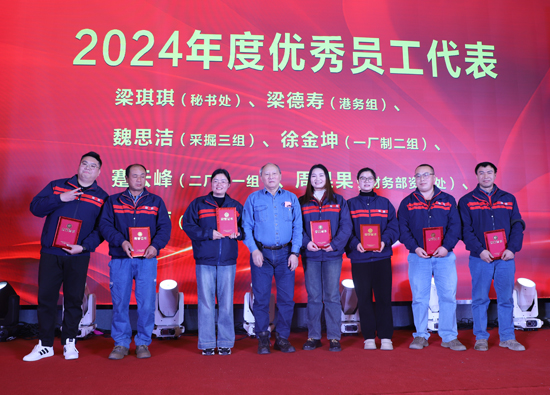02.2025 Group Briefing
Far Eastern Memorial Hospital introduces minimally invasive robotic arms to enhance treatment efficacy and safety
Far Eastern Memorial Hospital / Luo Yiyu


 To accelerate patient recovery and improve the quality of minimally invasive surgical services, On January 3, 2025, Far Eastern Memorial Hospital introduced its second latest generation da Vinci Xi surgical system, which can accurately simulate the natural movement of the human hand, eliminate hand tremors, improve surgical efficiency, and has high-resolution, 10x magnification 3D stereoscopic imaging. It is also equipped with fluorescence photography function, especially suitable for lymph node dissection and liver, gallbladder, and pancreatic surgery in cancer surgery. The lightweight robotic arm not only shortens installation time, but also supports extremely minimally invasive single hole surgery, which can hide the wound in the navel and reduce the impact on appearance.
To accelerate patient recovery and improve the quality of minimally invasive surgical services, On January 3, 2025, Far Eastern Memorial Hospital introduced its second latest generation da Vinci Xi surgical system, which can accurately simulate the natural movement of the human hand, eliminate hand tremors, improve surgical efficiency, and has high-resolution, 10x magnification 3D stereoscopic imaging. It is also equipped with fluorescence photography function, especially suitable for lymph node dissection and liver, gallbladder, and pancreatic surgery in cancer surgery. The lightweight robotic arm not only shortens installation time, but also supports extremely minimally invasive single hole surgery, which can hide the wound in the navel and reduce the impact on appearance.Far Eastern Memorial Hospital creates a new era of surgery with dual machine parallel operation
Since 2009, Far Eastern Memorial Hospital has introduced the da Vinci robotic arm system, which can perform surgeries through only 3 to 6 small incisions of about 1 centimeter, reducing postoperative pain, lowering the risk of infection, and accelerating recovery progress for patients. With the gradual manifestation of clinical empirical results, the National Health Insurance Bureau will include 65 types of robotic arm surgery costs in the payment scope from September 1, 2024, to promote medical policy and technological progress.
Considering that the previous generation Si system was gradually retired due to the discontinuation of consumables, Far Eastern Memorial Hospital adheres to the core goal of developing minimally invasive treatment, actively introduces the Xi system, and uses a dual machine parallel approach to achieve 1+1>2 operational efficiency, providing high-quality medical care for patients.
Minimally invasive medical technology reaches new heights with the application of da Vinci arms without boundaries
Dr. Xu Zhihao, a general surgeon, pointed out that, Far Eastern Memorial Hospital actively applies the da Vinci Xi system to various surgeries, including cholecystectomy, inguinal hernia repair, and liver tumor resection. The wound location designed by this system avoids the muscles in the lower abdominal wall of the rib cage, effectively reducing the pain of patients during suction and improving postoperative comfort.
Dr. Zhang Yaoren from the trauma department developed the da Vinci single port cholecystectomy surgery, which not only hides scars at the navel, but also demonstrates better performance in terms of average hospital stay, postoperative pain, and aesthetics compared to traditional minimally invasive surgery. In addition, Da Vinci's weight loss surgery uses a robotic arm for sleeve gastrectomy and intestinal bypass surgery, which significantly improves the accuracy and stability of weight loss surgery.
Dr. Huang Rixin, a cardiac surgeon, stated that traditional cardiac surgery requires a midline sternotomy, while the da Vinci robotic arm system only requires a very small incision in the left chest to complete the internal mammary artery extraction and bypass surgery. Research has shown that after patients undergo surgery using the da Vinci system, the vascular patency rate reaches 99% within one year, and the average length of hospital stay is reduced by 2 to 7 days, significantly better than traditional surgery which takes 7 to 10 days.
Dr. Lin Gengli, a rectal surgeon, explained that the application of the da Vinci robotic arm in rectal cancer surgery results in more accurate and thorough lymph node dissection. Although the surgery time may be longer, the effect is more ideal.
Dr. Yu Xiquan from the Department of Urology shared that the application of da Vinci robotic arms in urology is mature, especially in prostate cancer eradication surgery and nephrectomy surgery, which can effectively reduce intraoperative bleeding, improve surgical safety and success rate.
Dr. Zhuang Yizhen from the Department of Obstetrics and Gynecology emphasized that the da Vinci system performs accurately in uterine fibroid resection and endometrial cancer surgery. It can clearly identify the path of the ureter and uterine artery, safely separate and cut the uterus and surrounding important organs, and significantly reduce the risk of postoperative complications.
Dr. Zheng Pingjia from the Ear, Nose, and Throat Department added that the da Vinci System provides high-resolution 3D stereoscopic vision and flexible surgical tools in the treatment of sleep apnea and head and neck tumors, avoiding the need for large-scale surgical procedures in traditional surgeries and improving surgical safety and efficacy.
Minimally invasive surgery is one of Far Eastern Memorial Hospital's important core specialties, providing not only traditional laparoscopic surgery but also introducing cutting-edge auxiliary technologies such as 3D, 4K, and ICG to make the surgical process more precise and safe. Vice Dean Lin Ziyu called on patients in need to actively discuss their condition with doctors and evaluate whether they are suitable for minimally invasive surgery to achieve the best treatment effect. The minimally invasive surgery team at Far Eastern Memorial Hospital will strive for excellence, provide excellent medical services, fulfill the commitment of "continuously improving medical quality", and safeguard the health of every patient.
#




















